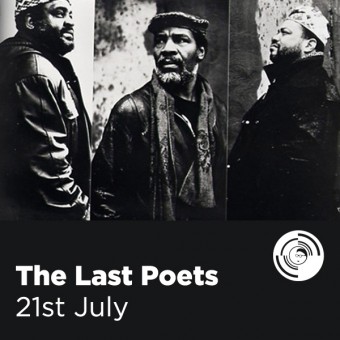The Last Poets
21 July / 19:30 / More Info / Buy Tickets
“A word hasn’t been coined to fit what we’re talking about,” The Last Poets told Rolling Stone in 1970. Today, The Last Poets are hailed as the fathers of rap.
Hip-hop history officially started in Harlem on May 16th, 1969 (Malcolm X’s birthday). Imprisoned after refusing to fight in the Vietnam War, Jalal Mansur Nuriddin began to blend spoken-word verse with street-corner beats, and befriended fellow inmates Omar Ben Hassen and Abiodun Oyewole. Upon their release, Hassen, Oyewole, and Nurridin (a.k.a. Alafia Pudim, a.k.a. Lightnin’ Rod), named their trio The Last Poets, after the work of a South African writer who predicted violence would destroy the current, last generation of poets. The Last Poets, dubbed “the village elders of the rap world” by The New York Times, created two of modern music’s most influential albums: The Last Poets (1970) and This Is Madness (1971). Combining politically charged street poetry with inventive yet tribal percussion, these records sparked the rap revolution.The group was soon electrifying audiences at both the Apollo Theater and on local television.
Thanks to their arresting fusion of politically outspoken lyrics and inventive percussion the music that still resonates more than 40 years later. Head to this rare live show at Band on the Wall and understand why Chuck D says, “The Last Poets are the birthplace of rap.”


